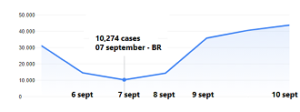
Arquivo para a ‘Social Network’ Categoria
The importance of weak links
In network theory, weak links are important, not in network media like facebook, instagram or other media, networks are forms of interpersonal relationships linked to certain interests and groups (hubs) that are important and could be more if they were understood dirty features and operating modes.
like facebook, instagram or other media, networks are forms of interpersonal relationships linked to certain interests and groups (hubs) that are important and could be more if they were understood dirty features and operating modes.
The weak link of a network, someone who is on the periphery of it and with little contact with the central group (the hubs) are in fact the great potential of these networks, in social life, in science and even in politics they were people with little connection with the power groups that made a difference.
Li from Alan Turing, creator of the modern digital computer model, who are “the times of people that nobody expects anything to do things that nobody can imagine”, he participated in a secret project at Bell Laboratories that unveiled the secret of the Enigma machine, of codification of messages of the Nazis during the 2nd. World War.
Einstein went to several schools, and it is not true that he was a poor student, he hated them all. his parents and teachers thought he had mental limitations, when in fact the school did not inspire him at all, he considered them weak.
Stevie Jobs, too, took little interest in his studies and was an easygoing student in the classroom, in a primary classroom when a teacher asked if they understood the universe, heard his reply that he did not understand “it is because we were so broke”.
Many are the simple people who point to a period of great difficulties, only media thinkers, networks of interests with audiences who want to hear certain responses to the current situation that are successful, in general they say that the pandemic is nothing, that when it passes let’s be happy, so it’s not just politicians looking at a complex reality with simplistic and poorly elaborated responses.
At the end of last week we said that “the last ones will be the first”, now we say something more than that, they are the ones that can make a difference, especially in the context of social and health severity that we are entering, in the “social network theory” Mark Granovetter, who studied the subject, explains that because they are distant, it is these weak ties that are able to take the message to be “shared” with people and groups from other circles, expanding the network.
GRANOVETTER, M. (1973). The strength of weak ties. In: American Journal of Sociology, University.
Hurry is the enemy of precaution
The country’s newspapers announce that Brazil will make an agreement to have the Russian vaccine, the race for the vaccine is causing some governments to abandon the precautionary measures necessary to arrive at a safe vaccine that does not cause even greater harm than pandemic, vaccine testing procedures are not any requirements, they are necessary and therefore the testing phase is long.
agreement to have the Russian vaccine, the race for the vaccine is causing some governments to abandon the precautionary measures necessary to arrive at a safe vaccine that does not cause even greater harm than pandemic, vaccine testing procedures are not any requirements, they are necessary and therefore the testing phase is long.
The data show that the pandemic is not controlled in Brazil, and that the data are growing in Europe, although in Italy, the growth is small, since restrictive measures are tougher, we enter autumn and winter will come.
The most optimistic deadlines were for December this year or the beginning of next year, some promising vaccines such as the Oxford / AstraZeneca vaccine that is also tested in Brazil by FioCruz and Pfizer that works in agreement with the German BioNTech, and make the forecast of vaccine for the end of the year, three more months can avoid lives and compensation.
However, the desire to appear as saving heroes, to tell the world that we teach a lesson, and especially to relinquish the economic pressures of sectors that are little concerned with the lives that are being lost, make the rush give way to the necessary medical and sanitary precautions in the midst of the pandemic, which even in Russia is growing.
We have already posted here that the principle of the Pfizer vaccine is the messenger RNA (mRNA) technique that gives instructions to the body to guide the production of antigens that allow the immune system to react to the disease.
The pharmaceutical company also assesses the potential of tofacitinib and aziotromycin for the early treatment of Covid-19.
The Russian vaccine follows the same principle as the Chinese one being tested in Brazil in partnership with the Butantã Brazilian Institute, that of a reduced viral load that awakens the immune system that produces antibodies necessary to fight the virus, however this technique is questionable since the virus suffers mutations and viral load may not be harmless.
Caution is needed, but government and health officials appear to have entered the dangerous path of haste
If that night comes
Europe lives on the fear of a new wave of the pandemic, and yet  the solidarity with those who die is still small, there is even an expression of feelings or some commotion, but the fraternal humanitarian feeling is localized to people who always walk in humanist actions in moments of crisis.
the solidarity with those who die is still small, there is even an expression of feelings or some commotion, but the fraternal humanitarian feeling is localized to people who always walk in humanist actions in moments of crisis.
What would happen if there were any natural catastrophe or something that would call humanity to consciousness in an even more serious way, of course it is not desirable and this panic should not be spread, but hypothetically if a deeper night befalls humanity, perhaps a new awareness of the grave situation of civilization was thought and achieved on a large scale.
It is also visible that those who are most supportive are the last ones in social valorization, already living in a serious situation, the pandemic makes them more supportive, there fraternity is a necessity for human survival itself.
The night and the blindness is not announced now by the pandemic, here in this blog in several posts we call attention to the cultural, social and even religious night of humanity, the path of the civilizing process seems to be collapsing, that is, whoever observes history while over the last few centuries it has been clearly visible, two wars, a process of social isolation of cultures, races and creeds, prejudice against migrants and mainly an increase in inequality.
If the night comes, unlike those who imagine that humble lives are “wasted lives”, it will be the arrogant and opulent lives that are less prepared for a “civilizing night” already underway.
It was not the pandemic that made this emerge, it just made evident and palpable what has been in process for some time, but what should be asked is if there was an extended, visible night that puts us in check.
It is not an apocalyptic or even a prophetic vision, while respecting them, a deep look at the inhuman, violent and antisocial processes that are being experienced, the decay and the worsening of the crisis is there.
If the night comes, few will be prepared, only those who are already in supportive environments and processes, those who during the lull period worked and experienced the fraternal, humanity and supportive side of everyday life.
The Covax vaccine agreement
The agreement of several countries to streamline the vaccine (Covax), including Brazil that signed at the last minute on Friday, provides for a minimum vaccination of 10% of the population (the option of Brazil) up to a maximum of 50% of the population , which once signed could not give up the compromised values, so Brazil signed at least, but this gives 42 million doses, it is not small and the risk is evident by the non-compliance with the whole testing protocol.
(Covax), including Brazil that signed at the last minute on Friday, provides for a minimum vaccination of 10% of the population (the option of Brazil) up to a maximum of 50% of the population , which once signed could not give up the compromised values, so Brazil signed at least, but this gives 42 million doses, it is not small and the risk is evident by the non-compliance with the whole testing protocol.
The government has not given up on the agreement already signed with AstraZeneca with the so-called “Oxford” vaccine that has the participation of the prestigious Brazilian Institute of FioCruz, while the government of the State of São Paulo promises to accelerate the process of the vaccine that is developed in China with participation USP – Butantan Institute.
The Brazilian agreement however provides that if the Oxford vaccine reaches the market first it may choose to maintain the bilateral vaccine purchase agreement, giving up the supply by the alliance, but it is likely that in the rush the Covax alliance will arrive first, then we will have to accept vaccination, which is fearful.
WHO director´s Tedros Adhanom Ghebreyesus said on August 13 that “COVAX already has nine vaccine candidates in its portfolio, which are in phase 2 or 3 of the trials”, but interestingly Janssen Pharmaceutics and Pfizer vaccine are not there.
To work the alliance needs U $ 38 billion, but it has less than U $ 3 billion, so it may be that this falls on the shoulders of countries that enter the alliance just to comply with international agreements, also in the social and economic aspect the agreement it’s w orrying.
A priori the agreement is so that the poorest countries have the same access as rich countries to the vaccines that are most likely to succeed, less than 10 are in the testing phase, and the financial volume can make the game of interest more serious. , as well as letting the use in poorer countries not have the concern of rich countries, these would be a kind of guinea pig, the WHO claims the opposite says that “it is to guarantee the access of poor countries”.
Brazil will receive 42 million vaccines, if there are any problems who will be responsible for this, it is clear that they will say that it is the country itself, by signing the agreement, it becomes “aware” of the “risks”, although they are not mentioned.
Even if it is very camouflaged it is a game of interests that seems very clear, it is likely that the less wealthy countries will receive doses of the vaccine first, and if verified safe will be used in rich countries, it is not an easy thesis to be proven, but the pressure in the less wealthy countries it was huge and Brazil signed at the last minute without saying the real reason.
Argentina, Brazil, Chile, Colombia, Mexico and Venezuela are among the countries that signed the agreement, and the Covax agreement is only part of the “Covid-19 Tool Access Accelerator”, or simply ACT Accelerator, which is the mechanism for response that WHO created for the pandemic, despite the term “accelerator” being avoided in interviews.
I hope to be wrong, but the economic game continues to prevail over the health of the population, especially the poor.
Justice and unemployment in the pandemic
The number of labor lawsuits and injustices that do not even reach the courts is expected to grow during the pandemic, according to expert data (some newspapers cite the Brazilian companies Datalawyer and FintedLab), indicate that this data should grow, among the complaints are the payment of monies. severance pay, for example the salary balance and a 40% fine on FGTS, Guarantee Fund for Length of Service in Brazil), and working conditions in the pandemic.
the courts is expected to grow during the pandemic, according to expert data (some newspapers cite the Brazilian companies Datalawyer and FintedLab), indicate that this data should grow, among the complaints are the payment of monies. severance pay, for example the salary balance and a 40% fine on FGTS, Guarantee Fund for Length of Service in Brazil), and working conditions in the pandemic.
We have already stressed in previous posts the importance of seeking employability models that combat the sharp change in unemployment during the epidemic, which was already high in Brazil, now according to the Ministry of Economy, from March to April, about 8 million people. people lost their jobs or had their wages cut, with 1.1 million formal jobs having their contracts terminated, and informal ones have even more voluminous data.
It is fair to help and pay fair wages to these people, of course, the logic of reducing wages and abolishing jobs is not justified because the pandemic does not reduce demand in essential sectors, in addition to creating new demands such as online services, services home office, assistance in areas such as health, education and security is there.
The situation becomes even more serious with the increase in prices, this means that some sectors are benefiting from the crisis, in addition to the amazing corruption in the health area, with unused hospitals, embezzlement of funds and even medicines and equipment is simply criminal, burdens states and municipalities, and disfavors public policies for emergency assistance and aid.
There is a biblical passage where the parable of the vintner is told that needing workers for his vineyard, he leaves at 9 in the morning to pick up more workers and then at 3 in the afternoon to pick up more workers, he combines a silver coin with everyone, it seems unfair , but it is he who pays and combines the salary, and in fact corrects the injustice of unemployment.
He tells the workers that he hires at 3 pm (Mt 20, 6-7): “´Why are you there all day unoccupied they replied: ´Because nobody hired us´. The boss said to them: ´Go to my vineyard too´ “.
And they all received the same salary, nothing more fair, this should be the logic of combating unemployment in the pandemic.
The law of the weakest
All the logic, including part of the scientific logic, is in defense of the law of the strongest, the pandemic shows that also the weakest should be thought of, people who have comorbidities, the elderly, diabetics, obese, in short, those who are weakened by some disease or living conditions (age, for example, and life on the outskirts).
of the law of the strongest, the pandemic shows that also the weakest should be thought of, people who have comorbidities, the elderly, diabetics, obese, in short, those who are weakened by some disease or living conditions (age, for example, and life on the outskirts).
It was the name of a film by Hector Babenco, Pixote: the law of the weakest, which is based on a true story, and which was starring by actor Fernando Ramos da Silva, the real Pixote of real life, that the director of the film knew, came dying shortly after the film, killed by police in city Diadema, in the neighborhood of São Paulo, Brazil.
The film tells the story of a boy who, without having met his parents, goes to live on the street, and after the theft of a wallet by a judge, he goes to a juvenile recovery institution in Brazil, FEBEM, which should be a re-education house, but in fact it is where they suffer abuse, violence, humiliation and may even lose their lives.
Thinking about the weakest means looking at a society and wishing for greater balance, in addition to income distribution, the treatment of dignity for all, respect and protection for those who for some reason become fragile in a social context of competition, consumption and inhumanity , where they will inevitably suffer even more if there is no protection.
The situation of the pandemic, in addition to exposing the medical fragility of many people, aggravates the situation of income distribution, which puts millions of people in a situation of despair and anguish, only a major turn of love and fraternity can prevent social and social chaos. even a civilizing crisis already in process.
Of course, each one can do their little part, but the policies developed by governments at different levels of public administration must be thought about those who work in the informal sector, in addition to the unemployment rate that was already high before the pandemic, those who need immediate help. and the way out of the crisis.
If you think only of the central engines of the economy, the result takes time to reach formal employment, then other emergency solutions can be thought of, such as: work fronts, micro-enterprises and assistance to small businesses that can employ a lot of people in the short term.
It is time for solidarity, unfortunately it is not what is seen anywhere, not even in those who say they are really concerned and who seek more denunciation than initiative and support for good initiatives, it is time for solidarity.
Because the issue of poverty is not resolved
It is not only due to the factors of inequality, the flow of wealth that always runs in one direction depends on the imbalance of areas such as education, infrastructures not only for health, but also for transport and sources of regional and national wealth, and for this external assistance is essential.
always runs in one direction depends on the imbalance of areas such as education, infrastructures not only for health, but also for transport and sources of regional and national wealth, and for this external assistance is essential.
The relationship between foreign aid and combating global poverty is positive and effective, say reports from many forums.
Perhaps some of the strongest examples of the effectiveness of foreign aid are the UN’s Millennium Development Goals, but the goals have not been achieved, domestic corruption and inefficient foreign aid.
These goals, proposed by the United Nations and ratified by all countries in the world, aimed at: reducing poverty, hunger and child mortality, but local and regional development plans were timidly attacked.
The so-called Borgen Project was actually aimed at the actions of local capitalists and outside interests,
The objectives proposed and ratified by all were:
– reduce poverty, hunger and child mortality;
– achieving universal primary education, gender equality and environmental sustainability;
– improving general health, fighting treatable diseases; and
– act as a global partnership for development.
They seem praiseworthy and hardly anyone would fail to support these plans, but the local application was to reduce birth rates, environmental sustainability without development, and treatable diseases are not really attacked, still childhood diseases persist, malaria is common in many regions of the country. Africa and there is a risk now of the pandemic.
There remains the fundamental problem of the global partnership for development, where one must look at interests, culture and what is socially valued locally, and unfortunately the colonialist mentality still prevails, the so-called decolonization comes to face this issue.
A process that contemplates this new process must be considered, observing authors and local cultures.
Effective aid to poverty
If, on the one hand, emergency aid is necessary, mainly because the pandemic prevents informal work and many families have saved with domestic workers, a medium and long-term recovery plan is needed to avoid even worse degradation and income distribution than the one that already exists.
pandemic prevents informal work and many families have saved with domestic workers, a medium and long-term recovery plan is needed to avoid even worse degradation and income distribution than the one that already exists.
Economist Muhammad Yunus is known throughout the world as “the banker of the poor”, but he is not really a banker in the conventional sense, as he assists people who have never had access to any banking system, what he fosters is an entrepreneurship, especially among women, and their results are surprising. It is true, however, that he founded a bank, the Grameen Bank in 1983 in Bangladesh, but today what he does most are lectures, he is one of the most requested speakers on the planet, and received among other awards, the Nobel Peace Prize in 2006.
In his lectures, he censors and criticizes bankers who aim only at easy profits, exorbitant interest and little or nothing look at the social reality in which they live, one of his well-known phrases says: “Dealing with economic theories in the face of people dying ], for me it was a joke ”, this is even more true in a pandemic.
Utilitarian productivism, production is necessary mainly in essential goods, is one that targets only the most attractive sectors where profit is high and the social impact is not always so high, with regard to the poor, and in the case of education and health, it is necessary even if profit is not considered, as it is an investment.
The idea that invaded several sectors, and unfortunately also in education and public health, that these sectors need to be productive is nothing but a reproduction of a savage capitalism incapable of managing the current crisis, and is only on the rise because of disinformation of the population, in dark times authoritarian theories gain a voice.
What Yunus says about jobs is very interesting: “An essential issue is the idea of employment. Who said we were born to look for a job? The school? The teachers? The books? Your religion? Your parents? Someone put this on people’s heads.
The educational system repeats: ‘You have to work hard’. Human beings were not born for this. The human being is full of creative power, but the system reduces him to a mere worker, capable of doing repetitive work. This is shameful, it is wrong ”, here we must also overcome left´s-wing economism.
The digital world in which anyone can have an online system and work in it, where “informal” jobs can make people from any location, including the periphery entrepreneurs, goes against Yunus’ proposal, to make “services” closer to the population periphery is made possible by the ubiquity of digital.
Entrepreneurs exist in all social strata, I even venture to say that they are concentrated in the periphery, the problem is who risks putting capital there, who could finance these “microentrepreneurs” from the periphery, there is a solution, the number of jobs can grow quickly and circulation of goods and income in fragile environments
Number of covid grows in Brazil and vaccines
The number of data has returned to grow, if we look at the valley of September 7, national holiday in Brazil, we see the valley of decrease with 10 thousand cases, in this short-term evaluation is better the number of infected, because the number of deaths will only be affected from 7 to 14 days, which in this period also returned to grow.
of September 7, national holiday in Brazil, we see the valley of decrease with 10 thousand cases, in this short-term evaluation is better the number of infected, because the number of deaths will only be affected from 7 to 14 days, which in this period also returned to grow.
It was a scandal and commented throughout the country the descent of São Paulo to the coastal beaches, coincidence or not, is a real and scientific data, the number of cases has returned to grow and the number of deaths has returned to close to a thousand daily.
While the vaccine does not come, we will have to live with this reality, the period of a possible lockdown passed the virus is in every country and the only isolation that works is the social to prevent infection among people close, starting precisely from the idea that everyone can be carriers of the virus now and all care is necessary.
Now we are waiting for the vaccine, and the case of a side effect of a woman in London of the Oxford vaccine, which uses the viral vector principle, the effect was a transverse myelitis that causes a neurological problem and high blood pressure, being possible that the cause was an external factor the formula, the woman passes well, there is evaluation of the case by a committee that is independent (see how complex and serious the tests should be) , and the resumption of testing has already been authorised, there are 6 more in testing phase.
It is important to note that the problem was the side effect and not the infection, the vaccine from Oxford and the Laboratory Astrazeneca, which has participation of the laboratory of Brazilian Fiocruz, has no possibility of infection, it does not replicate the virus, so it is considered safe, but side effect exist in any medicines and vaccines and should prescribe cases, such as those we found in the leaflets , of type, children or adults cannot take, etc.
The case was important for all of us to be aware of the seriousness and slowness of the tests, which are necessary.
Other vaccines go up in the “quote”, the Pfizer vaccine. which follows the nucleic acid (RNA) principle, and with good quotation in the medical area, but this is also subject to testing and without the evaluation of “contraindications” should not be rushed its use, therefore, the delay is necessary and this phase cannot be dispensed with.
Socially what we expect, after a period of help (it should go until the end of the year, but that is already there), we must already start thinking about the economic, social and educational consequences, they will be strong and will require the effort of all and one should think not as a weight, but as a social need that certain groups have protection.
This is the case of the elderly, children and socially marginalized groups, if society and public policies do not embrace these people, the social consequences that are already serious, could go to the field of out of control and it would be a tragedy.

